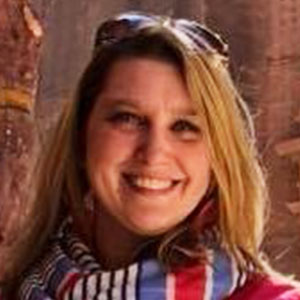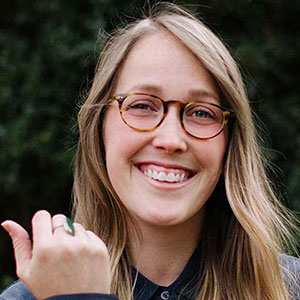
Irina Wang grew up as a first-generation Floridian with Taiwanese parents. She lived in the UK while completing her undergraduate studies and working for two years at renowned London design studio Pentagram. Upon graduating from University of the Arts London, Chelsea College of Arts, in 2015, she was granted the Mead Fellowship for continuing design work for endangered languages. In January 2018 she moved from England to New England, where she is currently obtaining a master’s in industrial design at Rhode Island School of Design. Irina has a soft spot for leavened bread, existentialist jokes, her old Bianchi bike, campfire smell, and the printed word. She attempts to dabble in far too many things, but believes that design can be a wide-angle lens to view—and change—the vast and varied world.
I’m most excited to work on projects that… address important global issues with a balance of gravitas and playfulness.
I’m looking for partners that can help me… contextualize problems from an expert’s perspective when designing within unfamiliar industries and professional circles.
A moment when I felt most inspired in my work was… designing educational materials for an endangered language in the politically oppressed Chittagong Hill Tracts of Bangladesh—a project at the intersection of my interests in typography, linguistics, literature, and anthropology. It changed my perception of the designer’s role and potential in addressing broken systems.
Innovations in my field I’m most excited to work on… will inevitably require a transdisciplinary process and navigating the ethics of humanitarian design.

Corey is the Nuclear Threat Initiative’s vice president of international fuel cycle strategies. She recently returned to NTI after a three-year leave, during which she served as senior coordinator for nuclear security and nonproliferation policy affairs at the National Nuclear Security Administration, US Department of Energy (DOE). Corey led the DOE’s Iran Task Force, responsible for implementing the Joint Comprehensive Plan of Action (JCPOA) with Iran, and was the lead for the 2016 Nuclear Security Summit. Previously, she led the development and launch of the World Institute for Nuclear Security (WINS), an international organization based in Vienna, Austria. She also played a significant role in NTI’s initiative to create an international low-enriched uranium bank at the International Atomic Energy Agency.
Corey is editor of the book Cultivating Confidence: Verification, Monitoring, and Enforcement for a World Free of Nuclear Weapons (Nuclear Threat Initiative, 2010) and coauthored NTI’s “Innovating Verification: New Tools and New Actors to Reduce Nuclear Risks” report series. She is currently president of the Institute of Nuclear Materials Management (INMM) and serves on the board of directors for WINS. Corey holds a BA in government with a concentration in international relations from Clark University in Worcester, MA, where she was elected to Phi Beta Kappa.

Carmen is an award-winning communications professional with experience in public affairs and marketing in the private, public, and nonprofit sectors. At the Nuclear Threat Initiative—a nonprofit, nonpartisan organization working to strengthen global security by reducing the risk of use and preventing the spread of nuclear, biological, and chemical weapons—she leads communications efforts that extend NTI’s reach among and impact on policymakers and also oversees education initiatives to engage broader publics. Her background includes work at Ogilvy Public Relations Worldwide, the US Department of Energy, Carnegie Endowment for International Peace, and the Congressional Commission on the Prevention of Weapons of Mass Destruction Proliferation and Terrorism.
I’m most excited to work on projects that… engage and empower new audiences to take action.
I’m looking for partners that can help me… with making technical and policy content come alive for non-experts and learning lessons from analytics
A moment when I felt most inspired in my work was… when NTI’s communications, data, and policy work came together to make tangible progress in the Nuclear Security Summit process.

Laicie is the founder and CEO of Inkstick Media and editor-in-chief of the foreign policy magazine Inkstick. Her background as a writer and photographer lends itself to an appreciation of storytelling in all of its forms. This is evident in her role as executive producer and host of the PRX- and Inkstick-produced podcast, “Things That Go Boom,” where she explores the “ins, outs, and whathaveyous of what keeps us safe.” She is also a partner with the Truman National Security Project. Laicie’s work has appeared in well-known newspapers, journals, and periodicals including Foreign Policy, The Washington Post, and The Wall Street Journal. She has appeared as an expert on CNN, MSNBC, and Fox News.
Prior to launching Inkstick, Laicie was a fellow with the Stimson Center’s Budgeting for Foreign Affairs and Defense program and policy director at the Center for Arms Control and Non-Proliferation. Her areas of expertise include US budget process, defense strategy, and nuclear weapons proliferation. Laicie previously held positions at Physicians for Social Responsibility, The Counter Terrorist Finance Organization, and Global Green USA, where her research focused on nuclear, chemical, and biological weapons in addition to the financing and structure of terrorist organizations.
I’m most excited to work on projects that… use storytelling to help translate dense issues and inspire a broad audience.
I’m looking for partners that can help me… scale Inkstick’s work responsibly and with the greatest impact.
A moment when I felt most inspired in my work was… throughout the process of creating and launching the podcast, “Things That Go Boom.”
Innovations in my field I’m most excited to work on… involve storytelling using a variety of tools: writing, photography, art, data visualization, and audio, to name a few.

Vincent holds a PhD in anthropology from Cornell University and an MSc in law, anthropology, and society from the London School of Economics. His first ethnographic project explored how Finland’s nuclear waste disposal experts grappled with deep time, death, and the limits of imagination when developing what will, in the 2020s, likely become the world’s first operational high-level nuclear waste repository. He is now developing a second ethnographic project exploring lessons learned from the 2014 waste drum breach accident at the US defense nuclear waste repository WIPP. Vincent has been a US National Science Foundation Graduate Research Fellow (2011-2016) and a Mellon Fellow at Cornell’s Society for the Humanities (2015-2016). Alongside his academic publications, Vincent has written articles for NPR, Forbes, Physics Today, Nautilus, and other outlets. His writings have been covered by Huffington Post, Forbes, Nevada Public Radio, Les Affaires, and the Long Now Foundation.
I’m most excited to work on projects that… cultivate my abilities to tell nuclear stories in written formats.
I’m looking for partners that can help me… co-author articles about nuclear expert life and place them in popular online or print media outlets.
A moment when I felt most inspired in my work was… when I became the first anthropologist with a feature article in Physics Today, the flagship publication of the American Institute of Physics.
Innovations in my field I’m most excited to work on… involve strategies to make nuclear issues more salient among younger generations of STEM experts.

Tom Weis teaches in the industrial design department at the Rhode Island School of Design, where he works with a faculty team to guide graduate students through their year-long thesis projects. His undergrad courses include advanced prototyping, aquaponics, and global security. Drawing upon a background in sculpture, cabinetry, and wooden boatbuilding, Tom pursued industrial design to further develop a creative process. This process has led his work to such places as the Cooper Hewitt National Design Museum, Time magazine’s Best Inventions of 2010, and Massachusetts General Hospital’s Russell MD Museum of History and Innovation. Weis is cofounder of the design firms Steel House and Hello. We Are _____. Since 2015, Weis has explored how design and creativity can work to reduce nuclear threats. He has presented at the American Academy of Arts and Sciences and the Disruptive Futures Nuclear Weapons Summit.
I’m most excited to work on projects that… inspire others to get involved and understand that they can make a difference in reducing nuclear risks.
I’m looking for partners that can help me… understand the most effective audiences to reach and explain the issues in ways that engage non-experts.
A moment when I felt most inspired in my work was… working with others with different approaches and perspectives to accomplish things I couldn’t have done alone.
Innovations in my field I’m most excited to work on… involve inspiring the next generations of designers to think carefully about the concepts, artifacts, and products they create to reduce the amount of “stuff” in the world.







